2 oct 2015
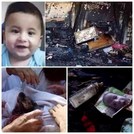
Hamas Movement praised Nablus shooting attack during which two Israeli settlers were killed, considering it “a natural reaction to Israeli crimes.”
In an exclusive statement to the PIC shortly after the attack, spokesman for the Movement Sami Abu Zuhri said that “Nablus operation was a natural reaction to Israeli escalation in al-Aqsa Mosque and settlers’ crimes against West Bankers, most notably was burning to death a Palestinian couple with their 18-month-old baby.”
Earlier Thursday, two Israeli settlers were allegedly killed while four others were injured in a shooting attack near Beit Furik checkpoint east of Nablus to the north of occupied West Bank.
"Hamas Movement blesses the operation and calls for continuing the struggle against the occupation", he said.
Hamas’s armed wing al-Qassam Brigades also blessed the operation, vowing that it will not be the last.
The Brigades described the operation as “heroic”, saying that it is a national response to Israeli crimes in occupied Jerusalem and West Bank.
On July 31, a group of settlers set fire to a Palestinian home in Duma town near Nablus, burning a toddler alive, while his parents died later of injuries they sustained during the arson attack. The only remaining survivor of the attack is the family's 4-year-old son.
In an exclusive statement to the PIC shortly after the attack, spokesman for the Movement Sami Abu Zuhri said that “Nablus operation was a natural reaction to Israeli escalation in al-Aqsa Mosque and settlers’ crimes against West Bankers, most notably was burning to death a Palestinian couple with their 18-month-old baby.”
Earlier Thursday, two Israeli settlers were allegedly killed while four others were injured in a shooting attack near Beit Furik checkpoint east of Nablus to the north of occupied West Bank.
"Hamas Movement blesses the operation and calls for continuing the struggle against the occupation", he said.
Hamas’s armed wing al-Qassam Brigades also blessed the operation, vowing that it will not be the last.
The Brigades described the operation as “heroic”, saying that it is a national response to Israeli crimes in occupied Jerusalem and West Bank.
On July 31, a group of settlers set fire to a Palestinian home in Duma town near Nablus, burning a toddler alive, while his parents died later of injuries they sustained during the arson attack. The only remaining survivor of the attack is the family's 4-year-old son.
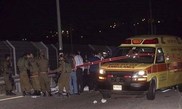
Eitam and Na'ama Henkin
Two Israeli settlers were allegedly killed in shooting attack near Beit Furik checkpoint east of Nablus to the north of occupied West Bank. Their 4 kids were not physically harmed.
Yediot Aharnot Hebrew Newspaper reported that “a husband and wife in their 30s, Eitam and Na'ama Henkin from the settlment of Neria, were killed in a drive-by shooting attack on the road between Itamar and Elon Moreh in the West Bank on Thursday night.”
The Israeli Army spokesman claimed that two Israelis were killed in the shooting attack, and that its forces were conducting sweeps in the area looking for the suspects.
The two Israelis came under fire when they slowed down before making a turn. At that moment, a Palestinian vehicle accelerated toward the family. Two attackers opened fire on the family with a handgun and a rifle, the sources added.
Shortly after the alleged shooting attack, the Israeli army raised the alert level throughout the West Bank in an attempt to arrest the suspects.
Israeli settlers have carried out over the past period a number of systematic attacks under Israeli forces’ protection against Palestinians and their properties on daily basis, causing a state of anger among Palestinians living near Israeli settlement outposts.
The attack comes as Israeli occupation and Jewish settlers step up their attacks against Palestinians in Gaza, Jerusalem. and the rest of the occupied West Bank.
Two Israeli settlers were allegedly killed in shooting attack near Beit Furik checkpoint east of Nablus to the north of occupied West Bank. Their 4 kids were not physically harmed.
Yediot Aharnot Hebrew Newspaper reported that “a husband and wife in their 30s, Eitam and Na'ama Henkin from the settlment of Neria, were killed in a drive-by shooting attack on the road between Itamar and Elon Moreh in the West Bank on Thursday night.”
The Israeli Army spokesman claimed that two Israelis were killed in the shooting attack, and that its forces were conducting sweeps in the area looking for the suspects.
The two Israelis came under fire when they slowed down before making a turn. At that moment, a Palestinian vehicle accelerated toward the family. Two attackers opened fire on the family with a handgun and a rifle, the sources added.
Shortly after the alleged shooting attack, the Israeli army raised the alert level throughout the West Bank in an attempt to arrest the suspects.
Israeli settlers have carried out over the past period a number of systematic attacks under Israeli forces’ protection against Palestinians and their properties on daily basis, causing a state of anger among Palestinians living near Israeli settlement outposts.
The attack comes as Israeli occupation and Jewish settlers step up their attacks against Palestinians in Gaza, Jerusalem. and the rest of the occupied West Bank.
26 sept 2015
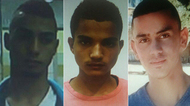
Shin Bet says suspects admitted to throwing stones at Alexander Levlovich's vehicle, causing him to crash; suspects all teens (16-19).
The Shin Bet and police forces arrested four Palestinian teens (16-19) suspected of playing a role in the stone-throwing attack on Rosh Hashanah that killed Israeli Alexander Levlovich, it was released for publication Saturday night.
Mahmoud Abed Rabbo Dawiyat, Mohammed Salah Mohammed Abu Keif, Waled Fares Mustafa Atrash and another minor who's details are under gag order, are from the Sur Bahar suburb of East Jerusalem and have Israeli identification cards.
Levlovich was killed on the eve of the Jewish New Year on his way home from dinner with family. The four Palestinians are accused of throwing stones at his vehicle, causing him to lose control and crash into a telephone pole.
During questioning, the four said they went out that evening with purpose, prepared to throw rocks at passing vehicles specifically on the eve of Rosh Hashanah.
Dawiyat, whom the Shin Bet said admitted to throwing the stones, added that he arrived at the location of the attack wearing a Hamas flag which he had received while participating in a rally in Umm al-Fahm for the al-Aqsa Mosque before the attack.
The teens said they threw rocks at several passing vehicles before striking Levlovich's car. After seeing the car hit the telephone pole, the four fled the scene and met later to agree on a cover story to cover their actions.
The Shin Bet and police forces arrested four Palestinian teens (16-19) suspected of playing a role in the stone-throwing attack on Rosh Hashanah that killed Israeli Alexander Levlovich, it was released for publication Saturday night.
Mahmoud Abed Rabbo Dawiyat, Mohammed Salah Mohammed Abu Keif, Waled Fares Mustafa Atrash and another minor who's details are under gag order, are from the Sur Bahar suburb of East Jerusalem and have Israeli identification cards.
Levlovich was killed on the eve of the Jewish New Year on his way home from dinner with family. The four Palestinians are accused of throwing stones at his vehicle, causing him to lose control and crash into a telephone pole.
During questioning, the four said they went out that evening with purpose, prepared to throw rocks at passing vehicles specifically on the eve of Rosh Hashanah.
Dawiyat, whom the Shin Bet said admitted to throwing the stones, added that he arrived at the location of the attack wearing a Hamas flag which he had received while participating in a rally in Umm al-Fahm for the al-Aqsa Mosque before the attack.
The teens said they threw rocks at several passing vehicles before striking Levlovich's car. After seeing the car hit the telephone pole, the four fled the scene and met later to agree on a cover story to cover their actions.
16 sept 2015
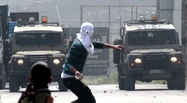
Israeli prime minister Benjamin Netanyahu will head an urgent session, on Tuesday evening, to discuss punishment for stone-throwing.
Israeli radio reported, according to Al Ray Palestinian Media Agency, that the session would be to discuss measures in confronting stone-throwing directed at Israeli vehicles in Jerusalem.
It was reported that the announcement comes in the wake of a deadly car crash Israeli police claimed was caused by stone-throwing.
Netanyahu is said to be seeking fast-track legislation for setting a minimum sentence for stone and firebomb throwing. He also will discuss providing administrative detention against the doers.
Palestinians living under Israeli military occupation routinely throw rocks at heavily armed security forces during clashes, as one of the few means available to protest their subjugation.
Youth often throw stones at settler cars driving in the occupied West Bank, while it is also common for settlers themselves -- both armed and protected by armed Israeli forces-- to target Palestinian vehicles with rocks.
Settler violence against Palestinians in the occupied West Bank is routine and goes unpunished by Israel, with 324 incidents of violence recorded in 2014, according to the UN Office for the Coordination of Humanitarian Affairs.
Israeli radio reported, according to Al Ray Palestinian Media Agency, that the session would be to discuss measures in confronting stone-throwing directed at Israeli vehicles in Jerusalem.
It was reported that the announcement comes in the wake of a deadly car crash Israeli police claimed was caused by stone-throwing.
Netanyahu is said to be seeking fast-track legislation for setting a minimum sentence for stone and firebomb throwing. He also will discuss providing administrative detention against the doers.
Palestinians living under Israeli military occupation routinely throw rocks at heavily armed security forces during clashes, as one of the few means available to protest their subjugation.
Youth often throw stones at settler cars driving in the occupied West Bank, while it is also common for settlers themselves -- both armed and protected by armed Israeli forces-- to target Palestinian vehicles with rocks.
Settler violence against Palestinians in the occupied West Bank is routine and goes unpunished by Israel, with 324 incidents of violence recorded in 2014, according to the UN Office for the Coordination of Humanitarian Affairs.
14 sept 2015
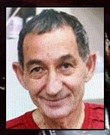
Alexander Lebelovitch 50
Man returning from Rosh Hashanah dinner loses control of car; police investigate if crash was result of stones being thrown at car or if driver had heart attack.
A man in Jerusalem was fatally wounded on Sunday night, the eve of Rosh Hashanah, when he lost control of his car after it was reportedly pelted with stones.
The vehicle struck a power line and tumbled into a roadside ditch. Police said they were investigating if stones thrown at the car caused the accident.
The driver, a man of about 50, was taken to Shaare Zedek Medical Center by an MDA team while paramedics attempted resuscitation in the ambulance. He succumbed to his wounds on Monday morning. Two others were lightly wounded in the incident. Jerusalem police said the passengers were returning from a Rosh Hashanah holiday dinner when they drove on a route on which Arabs were throwing stones.
However, questioning of the other passengers suggested that the driver had convulsed before losing control of the car, and police decided to continue investigating the cause of the accident. Police said there had been numerous reports of stone-throwing in the area before the incident. Sunday saw clashes in Jerusalem ahead of Rosh Hashanah.
Palestinians barricaded themselves inside al-Aqsa Mosque on the Temple Mount. Police forces broke into the compound and confiscated some of the equipment brought there by the Palestinians. At least nine people were arrested on Monday mornings as clashes continued.
An official at Prime Minister Benjamin Netanyahu's office announced that the prime minister would convene an "emergency meeting" over recent attacks.
Netanyahu will hold the consultations with top ministers Tuesday night after the Jewish new year holiday of Rosh Hashanah ends. "The prime minister views with great severity the throwing of rocks and fire bombs against Israeli citizens and intends to fight the phenomena by all means, including increasing punishment and enforcement," the official said anonymously according to protocol.
Man returning from Rosh Hashanah dinner loses control of car; police investigate if crash was result of stones being thrown at car or if driver had heart attack.
A man in Jerusalem was fatally wounded on Sunday night, the eve of Rosh Hashanah, when he lost control of his car after it was reportedly pelted with stones.
The vehicle struck a power line and tumbled into a roadside ditch. Police said they were investigating if stones thrown at the car caused the accident.
The driver, a man of about 50, was taken to Shaare Zedek Medical Center by an MDA team while paramedics attempted resuscitation in the ambulance. He succumbed to his wounds on Monday morning. Two others were lightly wounded in the incident. Jerusalem police said the passengers were returning from a Rosh Hashanah holiday dinner when they drove on a route on which Arabs were throwing stones.
However, questioning of the other passengers suggested that the driver had convulsed before losing control of the car, and police decided to continue investigating the cause of the accident. Police said there had been numerous reports of stone-throwing in the area before the incident. Sunday saw clashes in Jerusalem ahead of Rosh Hashanah.
Palestinians barricaded themselves inside al-Aqsa Mosque on the Temple Mount. Police forces broke into the compound and confiscated some of the equipment brought there by the Palestinians. At least nine people were arrested on Monday mornings as clashes continued.
An official at Prime Minister Benjamin Netanyahu's office announced that the prime minister would convene an "emergency meeting" over recent attacks.
Netanyahu will hold the consultations with top ministers Tuesday night after the Jewish new year holiday of Rosh Hashanah ends. "The prime minister views with great severity the throwing of rocks and fire bombs against Israeli citizens and intends to fight the phenomena by all means, including increasing punishment and enforcement," the official said anonymously according to protocol.
24 july 2015
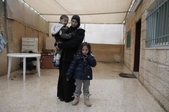
Nadiya Abu Jamal and two of her children stand in their house in occupied East Jerusalem on Nov. 27, 2014
The Israeli Supreme Court, on Wednesday, gave the family of a Palestinian man involved in an attack in Jerusalem until the beginning of October to leave to the occupied West Bank.
Ghassan Abu Jamal, 32, was killed by Israeli forces on Nov. 18, 2014, after him and his cousin, Uday, killed four rabbis and a policeman in a synagogue in West Jerusalem.
Ma'an News Agency reports that the Jerusalem residency of Ghassan’s wife, Nadiya, was revoked by Israeli authorities in May and she was ordered to move back to the West Bank where her family resides.
The Hamoked Center for the Defense of the Individual had then presented an appeal to the Minister of Interior and the Supreme Court to allow Nadiya to stay in Jerusalem with her three children on the grounds that the three had no relation to the attack.
The court refused the appeal and instead ruled that the children would be sent to the West Bank as well, ruling that the mother gained custody after the death of her husband.
Ghassan’s brother Muawiya said that the appeal had stressed the importance of keeping the family's children, Walid, 6, Salma, 4, and Muhammad, 3, with their mother in Jerusalem.
Forcing the children and their mother to leave Jerusalem means separating the children from their home, family and the village they grew up in, he said.
Nadiya is from the town of al-Sawahra al-Sharqiya south east of Jerusalem and holds a West Bank ID card. She married Ghassan in 2002 and applied for a reunion paper but was rejected until she received the approval for “residency and permit” in 2009 that enabled her to live in Jerusalem, as long as the permit was renewed every year.
Israeli policies make it near-impossible for Palestinians to obtain residency status in Jerusalem, and difficult for those who have it to retain it.
The residency status of 107 Palestinian residents in East Jerusalem was revoked in 2014, adding to the 14,309 Palestinians who have lost residency since 1967 despite being from the area.
Such revocations are part of Israeli policy in East Jerusalem which aims to maintain a 70 percent Jewish majority in the city, according to Israeli rights group B'Tselem.
Punitive measures as 'collective punishment'
Prior to Wednesday's order to permanently revoke the family's residency, the Abu Jamal family faced threats of home demolition to their East Jerusalem home.
Ghassan and Nadiya's three children, though allowed to remain in East Jerusalem at the time, were denied social benefits by Israeli authorities after November's attack.
“Israel claims to be democratic while deporting children from their home and separating them from their family," Nidaya said after the court ruling Wednesday.
"We live in shock and pain ever since Ghassan was killed, with orders to demolish our home and cancel the reunion and residency, and preventing my children from having their health insurance," she added.
Over the past two months, Israeli forces have entered and raided the homes of Ghassan and Uday Abu Jamal in the Jabal al-Mukabbir village of occupied East Jerusalem several times.
The forces reportedly searched and took photos of the homes as well as of all family members during such raids, the families say.
At the beginning of July, Israeli forces sealed off the home of Uday with steel boards and later destroyed a tent provided by the International Committee of the Red Cross for the displaced family to live in.
Israel stopped punitive house demolitions in 2009 but resumed the practice last November when Israeli forces razed the house of a Palestinian man that killed two Israelis by running over them with his car last October. Israeli rights group B'Tselem said in response that punitive house demolitions are "fundamentally wrong" and contravene "basic moral standards by punishing people for the misdeeds of others."
Watch dogs have widely criticized the Israeli policy saying that it contributes to a cycle of violence and merely inflicts collective punishment on family members.
The Israeli Supreme Court, on Wednesday, gave the family of a Palestinian man involved in an attack in Jerusalem until the beginning of October to leave to the occupied West Bank.
Ghassan Abu Jamal, 32, was killed by Israeli forces on Nov. 18, 2014, after him and his cousin, Uday, killed four rabbis and a policeman in a synagogue in West Jerusalem.
Ma'an News Agency reports that the Jerusalem residency of Ghassan’s wife, Nadiya, was revoked by Israeli authorities in May and she was ordered to move back to the West Bank where her family resides.
The Hamoked Center for the Defense of the Individual had then presented an appeal to the Minister of Interior and the Supreme Court to allow Nadiya to stay in Jerusalem with her three children on the grounds that the three had no relation to the attack.
The court refused the appeal and instead ruled that the children would be sent to the West Bank as well, ruling that the mother gained custody after the death of her husband.
Ghassan’s brother Muawiya said that the appeal had stressed the importance of keeping the family's children, Walid, 6, Salma, 4, and Muhammad, 3, with their mother in Jerusalem.
Forcing the children and their mother to leave Jerusalem means separating the children from their home, family and the village they grew up in, he said.
Nadiya is from the town of al-Sawahra al-Sharqiya south east of Jerusalem and holds a West Bank ID card. She married Ghassan in 2002 and applied for a reunion paper but was rejected until she received the approval for “residency and permit” in 2009 that enabled her to live in Jerusalem, as long as the permit was renewed every year.
Israeli policies make it near-impossible for Palestinians to obtain residency status in Jerusalem, and difficult for those who have it to retain it.
The residency status of 107 Palestinian residents in East Jerusalem was revoked in 2014, adding to the 14,309 Palestinians who have lost residency since 1967 despite being from the area.
Such revocations are part of Israeli policy in East Jerusalem which aims to maintain a 70 percent Jewish majority in the city, according to Israeli rights group B'Tselem.
Punitive measures as 'collective punishment'
Prior to Wednesday's order to permanently revoke the family's residency, the Abu Jamal family faced threats of home demolition to their East Jerusalem home.
Ghassan and Nadiya's three children, though allowed to remain in East Jerusalem at the time, were denied social benefits by Israeli authorities after November's attack.
“Israel claims to be democratic while deporting children from their home and separating them from their family," Nidaya said after the court ruling Wednesday.
"We live in shock and pain ever since Ghassan was killed, with orders to demolish our home and cancel the reunion and residency, and preventing my children from having their health insurance," she added.
Over the past two months, Israeli forces have entered and raided the homes of Ghassan and Uday Abu Jamal in the Jabal al-Mukabbir village of occupied East Jerusalem several times.
The forces reportedly searched and took photos of the homes as well as of all family members during such raids, the families say.
At the beginning of July, Israeli forces sealed off the home of Uday with steel boards and later destroyed a tent provided by the International Committee of the Red Cross for the displaced family to live in.
Israel stopped punitive house demolitions in 2009 but resumed the practice last November when Israeli forces razed the house of a Palestinian man that killed two Israelis by running over them with his car last October. Israeli rights group B'Tselem said in response that punitive house demolitions are "fundamentally wrong" and contravene "basic moral standards by punishing people for the misdeeds of others."
Watch dogs have widely criticized the Israeli policy saying that it contributes to a cycle of violence and merely inflicts collective punishment on family members.
15 july 2015
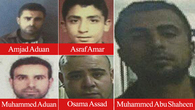
Shooter, a member of the PA's elite Force 17 unit, arrested after calling police and boasting of attack; four other accomplices also arrested.
Israeli security forces arrested the terrorist who killed Israeli hiker Danny Gonen near the settlement Dolev in the West Bank, along with four other suspects, it was cleared for publication on Wednesday.
The shooter was identified as Muhammed Abu Shaheen, 30 years old from Qalandiya, is a member of the Palestinian Authority's elite Force 17 unit. He was imprisoned between 2006-2008 after confessing his intention to carry out a terror attack.
During questioning, Abu Shaheen confessed to the shooting and said he had collected intelligence before committing the attack. He also admitted to six other shooting attacks in the last year, including one in November 2014 in Al-Ram, in which a soldier was wounded.
The five were arrested about a week and a half after the attack, when troops raided the suspects' homes.
According to investigators, there was no connection between the arrested cell members and the cell that committed the terror attack near Shvut Rachel, in which Israeli Malachi Rosenfeld was killed, or the shooting at an ambulance near Beit El. However, the Shin Bet reportedly made new discoveries about those attacks over the last few days.
Aharon Gonen, Danny's uncle, said he had spoken to the victim's mother and that the arrests had brought back very difficult emotions. "She is still upset," he said. "Every development or event causes a flood of emotions and brings up all the thoughts and longing again. We never for a moment doubted that security forces would get their hands on the terrorists, and we also knew it could take days, weeks, or month."
Gonen said the family was told earlier in the week that progress has been made in the case and that Palestinian suspects have been arrested.
The attack took place on June 19, when Gonen and a friend were driving away from a spring near the Dolev settlement in the Binyamin area of the West Bank. A Palestinian man signaled for them to stop as if to ask for help before firing at them from point-blank range, critically wounding Gonen.
The case reached a turning point when the Judea and Samaria District emergency center received a call from the attacker, saying he committed a terror attack and shot Israelis. The Shin Bet then traced the call, leading them to Qalandiya. One of the arrestees was Amjad Aduan, 35, who was previously detained for planning terror attacks. He is suspected of supplying Abu Shaheen with ammunition and served as a lookout at several shooting attacks.
The other suspects who were arrested are Asraf Amar, a 24-year-old member of PA military Intelligence, Fatah member Osama Assad, 29, who was released in the Shalit deal and is suspected of hiding the gun that Abu Shaheen used for the attack in his home; and Muhammed Aduan, 37, who has no history of security offenses, who is also suspected of hiding weapons for Abu Shaheen.
The terror cell belongs to the Tanzim militia founded by Fatah, which has been working to rebuild its infrastructure in the West Bank over the past year. These are young terror operatives, who do not answer to Fatah or the Palestinian Authority.
Israeli security forces arrested the terrorist who killed Israeli hiker Danny Gonen near the settlement Dolev in the West Bank, along with four other suspects, it was cleared for publication on Wednesday.
The shooter was identified as Muhammed Abu Shaheen, 30 years old from Qalandiya, is a member of the Palestinian Authority's elite Force 17 unit. He was imprisoned between 2006-2008 after confessing his intention to carry out a terror attack.
During questioning, Abu Shaheen confessed to the shooting and said he had collected intelligence before committing the attack. He also admitted to six other shooting attacks in the last year, including one in November 2014 in Al-Ram, in which a soldier was wounded.
The five were arrested about a week and a half after the attack, when troops raided the suspects' homes.
According to investigators, there was no connection between the arrested cell members and the cell that committed the terror attack near Shvut Rachel, in which Israeli Malachi Rosenfeld was killed, or the shooting at an ambulance near Beit El. However, the Shin Bet reportedly made new discoveries about those attacks over the last few days.
Aharon Gonen, Danny's uncle, said he had spoken to the victim's mother and that the arrests had brought back very difficult emotions. "She is still upset," he said. "Every development or event causes a flood of emotions and brings up all the thoughts and longing again. We never for a moment doubted that security forces would get their hands on the terrorists, and we also knew it could take days, weeks, or month."
Gonen said the family was told earlier in the week that progress has been made in the case and that Palestinian suspects have been arrested.
The attack took place on June 19, when Gonen and a friend were driving away from a spring near the Dolev settlement in the Binyamin area of the West Bank. A Palestinian man signaled for them to stop as if to ask for help before firing at them from point-blank range, critically wounding Gonen.
The case reached a turning point when the Judea and Samaria District emergency center received a call from the attacker, saying he committed a terror attack and shot Israelis. The Shin Bet then traced the call, leading them to Qalandiya. One of the arrestees was Amjad Aduan, 35, who was previously detained for planning terror attacks. He is suspected of supplying Abu Shaheen with ammunition and served as a lookout at several shooting attacks.
The other suspects who were arrested are Asraf Amar, a 24-year-old member of PA military Intelligence, Fatah member Osama Assad, 29, who was released in the Shalit deal and is suspected of hiding the gun that Abu Shaheen used for the attack in his home; and Muhammed Aduan, 37, who has no history of security offenses, who is also suspected of hiding weapons for Abu Shaheen.
The terror cell belongs to the Tanzim militia founded by Fatah, which has been working to rebuild its infrastructure in the West Bank over the past year. These are young terror operatives, who do not answer to Fatah or the Palestinian Authority.
6 july 2015

Israeli Defense Minister Moshe Ya’alon promised yesterday that he would not hesitate until those responsible for Wednesday’s shooting (which left four settlers wounded, one of whom later died from his injuries) were arrested.
Ya’alon wrote on his Facebook account that: “This evening I visited the family of Malachy Rosenfeld who was killed in last week’s shooting, an authentic and dignified family that was tragically forced to bury their son for the second time”.
He added: “We will not stop until we get our hands on the murderers”.
The shooting was carried out on Wednesday last week on a settler car near the settlement of Shafut Rachel. At the time, four settlers were reported wounded and one with serious injuries, who later died in hospital from his wounds.
Ya’alon wrote on his Facebook account that: “This evening I visited the family of Malachy Rosenfeld who was killed in last week’s shooting, an authentic and dignified family that was tragically forced to bury their son for the second time”.
He added: “We will not stop until we get our hands on the murderers”.
The shooting was carried out on Wednesday last week on a settler car near the settlement of Shafut Rachel. At the time, four settlers were reported wounded and one with serious injuries, who later died in hospital from his wounds.
30 june 2015
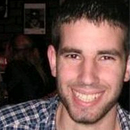
Malachi Moshe Rosenfeld, 25
Malachi Moshe Rosenfeld dies after being seriously wounded in terror attack near Shilo last night.
Malachi Moshe Rosenfeld, 25, who was seriously wounded at a drive-by shooting attack near Shilo on Monday night, succumbed to his wounds at the Shaare Zedek Medical Center in Jerusalem on Tuesday, his family said.
Initial investigation found that two terrorists ambushed Israeli vehicles in a car with Palestinian plates on the Alon road, a side road, but relatively well-lit, near the settlement Shilo. Shortly before 11 pm, the terrorists noticed an Israeli vehicle traveling their way, and opened fire at the front of the car from short-range. At least 15 9 mm bullets hit the Israeli car.
The terrorists continued firing at the vehicle even after the driver made a sharp turn towards the settlement Migdalim. After driving for 200 meters more, the Israeli vehicle stopped and its passengers called for help.
The terrorists managed to flee the scene in their car. Palestinians have complete freedom of movement on this road, as they do on all other main roads in the West Bank - this is not expected to change following the attack.
The IDF decided on Tuesday to reinforce its presence in the West Bank with an additional infantry battalion from the Nahal Brigade as a result of the recent spike in terror attacks in the area. The battalion will deal with defensive operations.
A high ranking official in the IDF said, "There is no collective punishment to the Palestinian population, and the steps that have been taken are a direct result of the current situation assessment and intelligence picture."
"The moment we get our hands on the perpetrators of the recent attacks we believe that the attacks will stop," he added. "The coordination with the Palestinian security forces continues as do the conversations with the settlers."
He also stressed that Israel was "far from what happened in the second intifada notwithstanding recent attacks. The recent attacks are a local group, and there is no connection between the attacks. There is no terror infrastructure behind the attacks."
'Malachi took on big brother role'
Rosenfeld, the son of popular Israeli clarinetist Eliezer Rosenfeld, was a graduate of the Machon Lev technological yeshiva in Jerusalem, and was studying at the Hebrew University.
Rosenfeld's parents, Eliezer and Sarah, expressed frustration at the lack of safety they felt due to the deteriorating security situation.
They asked "security forces and those whose job it is to do as all free countries do and provide us with security." They also decried the fact there were "no appropriate responses" to the recent series of attacks.
The two parents said that since they lost Malachi's older brother, an IAF pilot who died on a trip to Tze'elim Stream in the Judean Desert in 2002, "Malachi took the big brother role upon himself. He has a lot of love to the younger children in the family."
After learning of his son's passing, Eliezer told Ynet that Malachi "was a exceptional child, very clever, rationalist, genius and sensitive... he was always victorious and was the king of the world. Yesterday he only went to play basketball, came back to the settlement and was murdered in cold blood. This is a terrible tragedy."
Rosenfeld's cousin Ariel Bar Asher said that "Malachi was very much like his brother who died, both externally and internally. He had a good soul, friendly, pleasant, a genius and brilliant... he took charge of the family after his brother was killed. He was about to finish his bachelor's degree in a month."
The family consented to a request from the National Transplant Center to donate Malachi's cornea. "This is a big mitzvah," his father said.
'Terrorists fired for maybe 5 seconds'
Yair Hoffer, who was lightly wounded in the shooting, recounted the attack on Tuesday morning. "When we returned from the basketball game, a vehicle was slowly driving in front of us, and suddenly we heard the shots and realized we were being shot at," he said.
"Thank God, we were a few meters away from the junction. If I had been driving, we might have been closer to the junction and it would have been easier for them to aim. I didn't see how many people were there. I guess they shot about a magazine. When they were done they didn't drive very fast, they drove slowly, I think they were debating whether to leave the vehicle. I crawled outside through the window.
"When the shots start you just curl up and try to protect your head. I will never forgoet the feeling, it's just helplessness. When someone decides to try to take your life, and you didn't do anything to him. Decided to try taking your life because he realized you're a Jew. And you're helpless…
"It's also important for me to say, they say 'settlers', like if it were in Tel Aviv it would be different. I'm a settler, what does that mean? I grew up in Jerusalem and I looked for a nice place with a community to raise my children."
Another one of the wounded, Hananel (Hani) Cohen, 26 from Kokhav HaShahar, was the one who drove the car that came under the terrorists' fire.
Cohen is hospitalized at the Hadassah Medical Center in Jerusalem's Ein Karem with a bullet wound to his leg.
He said that the Kokhav HaShahar basketball team was playing a game in the settlement of Eli as part of the Binyamin Regional Council's league, which ended at around 10 pm.
"At 10:50 pm, at the Gideon Junction on a road going from Esh Kodesh to the Alon road, I identified a car coming from the left and had the right of way. I slowed down and let him pass. It went into the junction and instead of driving on, it slowed down. We saw a gun barrel peeking out of the front window and it started shooting. It was a short weapon, looked like an X-95 but the bullets were different," he said.
"It fired for maybe five seconds. I tried to step on the gas and veer to the other direction but the car did not respond. After a few shots, the terrorists' car started driving south. My car crawled in the opposite direction. I drove maybe 150 meters and dialed the police at the same time," he continued.
"I realized we were all wounded. Both of the friends sitting in the back got out. Behind us came a vehicle and an officer came out of it and started providing us with help. After that another car arrived and several minutes later another military vehicle that realized what was happened. I was in the best situation, relative to the others. I tried to talk to the police and Magen David Adom and update them on what happened."
Malachi Moshe Rosenfeld dies after being seriously wounded in terror attack near Shilo last night.
Malachi Moshe Rosenfeld, 25, who was seriously wounded at a drive-by shooting attack near Shilo on Monday night, succumbed to his wounds at the Shaare Zedek Medical Center in Jerusalem on Tuesday, his family said.
Initial investigation found that two terrorists ambushed Israeli vehicles in a car with Palestinian plates on the Alon road, a side road, but relatively well-lit, near the settlement Shilo. Shortly before 11 pm, the terrorists noticed an Israeli vehicle traveling their way, and opened fire at the front of the car from short-range. At least 15 9 mm bullets hit the Israeli car.
The terrorists continued firing at the vehicle even after the driver made a sharp turn towards the settlement Migdalim. After driving for 200 meters more, the Israeli vehicle stopped and its passengers called for help.
The terrorists managed to flee the scene in their car. Palestinians have complete freedom of movement on this road, as they do on all other main roads in the West Bank - this is not expected to change following the attack.
The IDF decided on Tuesday to reinforce its presence in the West Bank with an additional infantry battalion from the Nahal Brigade as a result of the recent spike in terror attacks in the area. The battalion will deal with defensive operations.
A high ranking official in the IDF said, "There is no collective punishment to the Palestinian population, and the steps that have been taken are a direct result of the current situation assessment and intelligence picture."
"The moment we get our hands on the perpetrators of the recent attacks we believe that the attacks will stop," he added. "The coordination with the Palestinian security forces continues as do the conversations with the settlers."
He also stressed that Israel was "far from what happened in the second intifada notwithstanding recent attacks. The recent attacks are a local group, and there is no connection between the attacks. There is no terror infrastructure behind the attacks."
'Malachi took on big brother role'
Rosenfeld, the son of popular Israeli clarinetist Eliezer Rosenfeld, was a graduate of the Machon Lev technological yeshiva in Jerusalem, and was studying at the Hebrew University.
Rosenfeld's parents, Eliezer and Sarah, expressed frustration at the lack of safety they felt due to the deteriorating security situation.
They asked "security forces and those whose job it is to do as all free countries do and provide us with security." They also decried the fact there were "no appropriate responses" to the recent series of attacks.
The two parents said that since they lost Malachi's older brother, an IAF pilot who died on a trip to Tze'elim Stream in the Judean Desert in 2002, "Malachi took the big brother role upon himself. He has a lot of love to the younger children in the family."
After learning of his son's passing, Eliezer told Ynet that Malachi "was a exceptional child, very clever, rationalist, genius and sensitive... he was always victorious and was the king of the world. Yesterday he only went to play basketball, came back to the settlement and was murdered in cold blood. This is a terrible tragedy."
Rosenfeld's cousin Ariel Bar Asher said that "Malachi was very much like his brother who died, both externally and internally. He had a good soul, friendly, pleasant, a genius and brilliant... he took charge of the family after his brother was killed. He was about to finish his bachelor's degree in a month."
The family consented to a request from the National Transplant Center to donate Malachi's cornea. "This is a big mitzvah," his father said.
'Terrorists fired for maybe 5 seconds'
Yair Hoffer, who was lightly wounded in the shooting, recounted the attack on Tuesday morning. "When we returned from the basketball game, a vehicle was slowly driving in front of us, and suddenly we heard the shots and realized we were being shot at," he said.
"Thank God, we were a few meters away from the junction. If I had been driving, we might have been closer to the junction and it would have been easier for them to aim. I didn't see how many people were there. I guess they shot about a magazine. When they were done they didn't drive very fast, they drove slowly, I think they were debating whether to leave the vehicle. I crawled outside through the window.
"When the shots start you just curl up and try to protect your head. I will never forgoet the feeling, it's just helplessness. When someone decides to try to take your life, and you didn't do anything to him. Decided to try taking your life because he realized you're a Jew. And you're helpless…
"It's also important for me to say, they say 'settlers', like if it were in Tel Aviv it would be different. I'm a settler, what does that mean? I grew up in Jerusalem and I looked for a nice place with a community to raise my children."
Another one of the wounded, Hananel (Hani) Cohen, 26 from Kokhav HaShahar, was the one who drove the car that came under the terrorists' fire.
Cohen is hospitalized at the Hadassah Medical Center in Jerusalem's Ein Karem with a bullet wound to his leg.
He said that the Kokhav HaShahar basketball team was playing a game in the settlement of Eli as part of the Binyamin Regional Council's league, which ended at around 10 pm.
"At 10:50 pm, at the Gideon Junction on a road going from Esh Kodesh to the Alon road, I identified a car coming from the left and had the right of way. I slowed down and let him pass. It went into the junction and instead of driving on, it slowed down. We saw a gun barrel peeking out of the front window and it started shooting. It was a short weapon, looked like an X-95 but the bullets were different," he said.
"It fired for maybe five seconds. I tried to step on the gas and veer to the other direction but the car did not respond. After a few shots, the terrorists' car started driving south. My car crawled in the opposite direction. I drove maybe 150 meters and dialed the police at the same time," he continued.
"I realized we were all wounded. Both of the friends sitting in the back got out. Behind us came a vehicle and an officer came out of it and started providing us with help. After that another car arrived and several minutes later another military vehicle that realized what was happened. I was in the best situation, relative to the others. I tried to talk to the police and Magen David Adom and update them on what happened."
24 june 2015
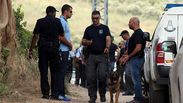
David Bar 70
Farmer beat to death in his field near Rehovot; police search for two suspects who fled the scene after beating David Bar to death.
Two illegal Palestinian workers are suspect in the murder of a 70-year-old farmer, David Bar, who was declared deceased Wednesday evening at Assaf HaRofeh Medical Center after being severely beaten in his fields in Moshav Pedaya near Rehovot where Bar lived.
The suspects fled from the scene after the incident and police have launched a manhunt, hoping to arrest them.
The motivation for the murder remains unclear, but initial investigations suggest that Bar was beat with a single object. He called the authorities for help before collapsing under the attack.
Paramedics who arrived on the scene found the farmer in serious condition with bruises to his head and upper body, seemingly from the object he was beaten with. After initial treatment on the scene he was transported to the hospital where he was officially declared deceased.
Farmer beat to death in his field near Rehovot; police search for two suspects who fled the scene after beating David Bar to death.
Two illegal Palestinian workers are suspect in the murder of a 70-year-old farmer, David Bar, who was declared deceased Wednesday evening at Assaf HaRofeh Medical Center after being severely beaten in his fields in Moshav Pedaya near Rehovot where Bar lived.
The suspects fled from the scene after the incident and police have launched a manhunt, hoping to arrest them.
The motivation for the murder remains unclear, but initial investigations suggest that Bar was beat with a single object. He called the authorities for help before collapsing under the attack.
Paramedics who arrived on the scene found the farmer in serious condition with bruises to his head and upper body, seemingly from the object he was beaten with. After initial treatment on the scene he was transported to the hospital where he was officially declared deceased.
